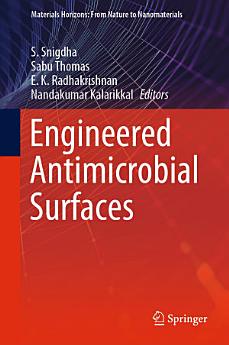Engineered Antimicrobial Surfaces
About this ebook
About the author
Snigdha S. completed her Ph.D. at the International and Inter University Centre for Nanoscience and Nanotechnology (IIUCNN), at Mahatma Gandhi University, Kottayam, India, where her research focused on nanostructured materials for microbiological applications.
Sabu Thomas is currently Professor and Pro-Vice Chancellor at Mahatma Gandhi University, Kerala, India. Prof Thomas' research has spanned many areas of nanocomposite and polymer science and engineering, and he has edited more than 70 books, holds 5 patents and has authored over 750 research publications.
Radhakrishnan E. K. is an Assistant Professor in the School of Biosciences at Mahatma Gandhi University, Kerala, India. His research focuses on biological and metabolic processes in bacteria, bioactive compound synthesis, biofilm formation, metal nanoparticles synthesis and thin films for antimicrobial applications.
Nandakumar Kalarikkal, is Professor & Head of the Advanced Materials Laboratory in the School of Pure and Applied Physics as well as the Honorary Director of IIUCNN at Mahatma Gandhi University, Kerala, India. His research focuses on the synthesis, characterization and applications of nanomaterials, phase transitions, and the effect of ion irradiation on novel materials.






